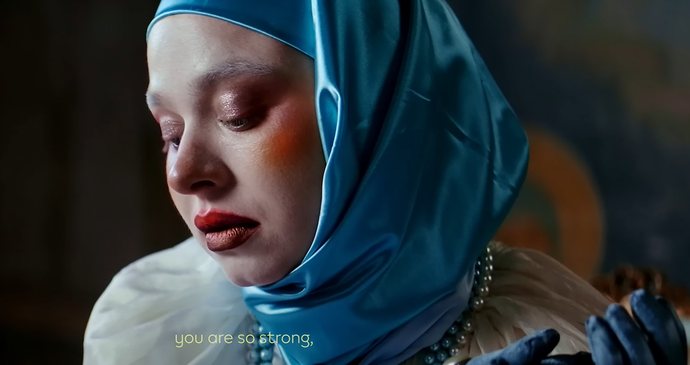The six girls return to the all-Slavic idea and draw on folklore in their hit song, which is sung in English and Bulgarian in addition to Czech and the main chorus is in Ukrainian. But quite unfortunately, according to the journalist and part of the Ukrainian public. Moreover, in the video clip of Vesna and in the lyrics of the song, there are elements that were used by the Soviet Union and now Russia for their propaganda.
“It has great music, but otherwise it’s basically a song about how we all have to love each other even though there’s a war. I don’t understand because there has been no love in my life for at least a year and I don’t even know when it will come back. Then there are several pro-Russian narratives and such classic, subtle, soft propaganda. Visually, they put some Ukrainian symbols into the clip and turned them into cheap versions,” Marharyta Golobrodska from the ProUkraine website commented on the song in the podcast.
Dance after violence
She is bothered by the very beginning of the song, in which it is idealized that there was love and sisterhood in a kind of Slavic kingdom, before the shadow crept into it and everything was forgotten. “However, it is not a shadow, but a specific country that launched a specific attack. This country is represented in the clip by men in purple suits. From the beginning, the girls are beaten, oppressed and have televisions on their heads, which are probably a symbol of propaganda. At the end, the girls happily dance hand in hand with them, so even though they did the whole song with you, we end up making good friends with them, we will choose love and we will all forget everything,” the journalist points out the naivety of the clip.
One of those creeping motives, which is also used by pro-Russian propaganda, is that Ukraine is attacking itself. This motif is seen by Marharyt in a woman wearing clothes resembling a Ukrainian costume and drawing red lipstick on her face, while the purple attacker watches her. “Russian television is spreading that Ukrainians are attacking their own country, that Buča was actually falsified and we are making everything up ourselves. And then I watch how the girl metaphorically hurts herself,” reveals another element of Kremlin propaganda. Other motifs that, according to Marharyta, are Russian or pro-Russian and appear in the song and its video clip, she discussed in the podcast.

The song was also discussed in the Ukrainian public space. According to Marharyta, it was probably the most visible message in the field of culture. “This is probably one of the most important news outside of the war news, because Ukrainians value support very much. At first, when there was talk of the Czech Republic submitting a song where something sounds Ukrainian, of course everyone was excited about it. I don’t want Ukrainians to look ungrateful, but when there are narratives spread by Russia in the song, of course it hurts and we can’t help but draw attention to it and close our eyes. Eurovision is a huge competition and we don’t want people singing about the brotherhood of Russians and Ukraine in Liverpool. I think there was just a misunderstanding and I would like to talk about it,” Marharyta concluded.
What other pro-Russian/Russian elements and narratives does the song contain, why is Eurovision extremely popular in Ukraine and who will the warring state send to fight this time, Marharyta Golobrodska revealed in Blesk Podcast:








